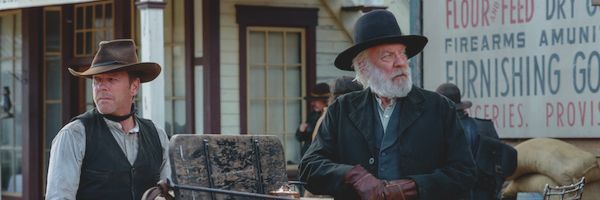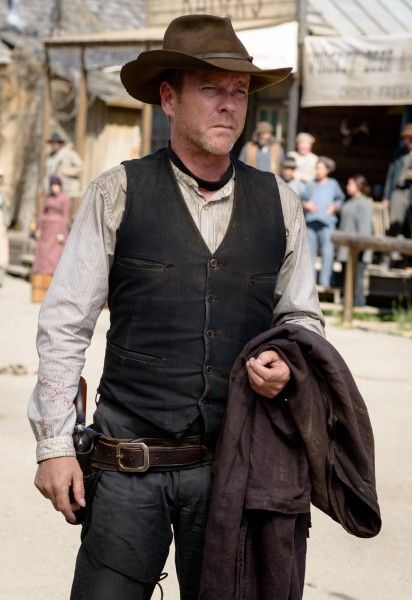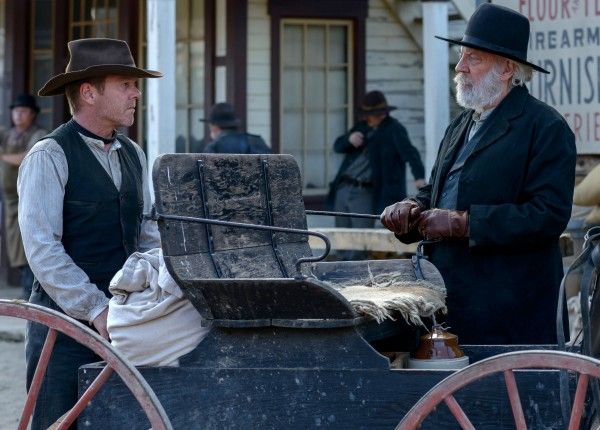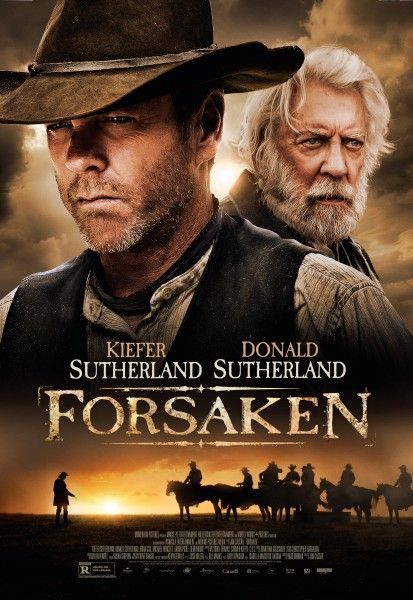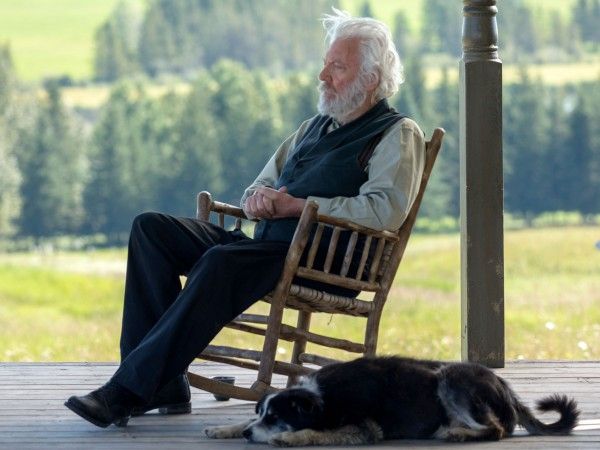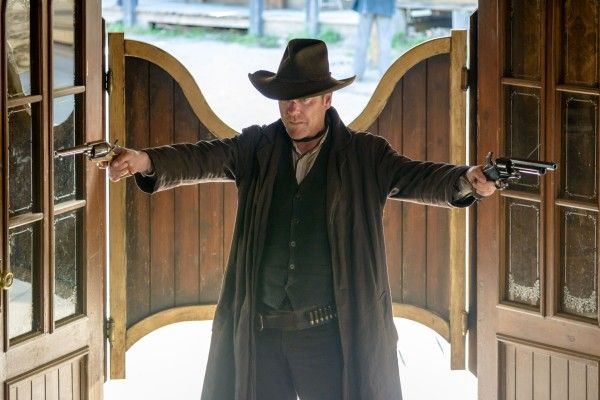Directed by Jon Cassar and written by Brad Mirman, the indie Western Forsaken follows retired gunfighter John Henry Clayton (Kiefer Sutherland), as he returns to his hometown of Fowler, Wyoming with the hope of repairing his relationship with his estranged father, Reverend Clayton (Donald Sutherland). However, he quickly learns that the town he left is in far more turmoil upon his return, as the railroad is coming and a criminal gang is terrorizing the ranchers who refuse to sell their land, and he is the only one who can stop them.
At the press day for the film, actor Kiefer Sutherland spoke to Collider for this exclusive interview about finally fulfilling his 30-year desire to share the screen with his father, why the father-son dynamic is so interesting to explore, what he learned about his father’s approach to acting, and putting together the perfect piece of material. He also talked about becoming the guardian for any character he plays long-term, whether it be Jack Bauer on nine seasons of 24 or his upcoming ABC series Designated Survivor, and the advice he would give actor Corey Hawkins, as he steps into the lead role on 24: Legacy.
Collider: You’d been wanting to work with your father for many years now. What made this dynamic the right one to play?
KIEFER SUTHERLAND: I think the father-son dynamic is interesting. I don’t have a male friend who hasn’t had some kind of conflict with their dad, and I don’t have a male friend who hasn’t had some kind of conflict with their son. If you take a look at our natural history, there’s always a moment where the young lion wants to challenge the older lion and, inherently, that’s going to be problematic, and I don’t think we’re any different. I also don’t think it’s something that’s explored very often. But why I specifically liked this story was, because they’re so deeply estranged at the beginning, it really was a path to reconciliation that requires acceptance and then, ultimately, forgiveness and letting go. I think those are three really important statements to make. I’ll be interested to see if it’s cathartic for men, in that way. Having said all of that, it was never intended to be nor was it cathartic for my father and I. People have asked us if it brought us closer, but we were close, to begin with. We approached it as two actors approaching a piece of material. But having said that, I have to be honest that there were moments when the fact that it was my father and I was looking into my father’s eyes, which I’ve known for 49 years, I did have a visceral reaction to that. So, it was a unique experience, but the intention was just to tell this story as two actors. This was not some kind of groovy healing experiment for the two of us, although that would have been a cool story. It was the kind of story that we wanted to tell, as a father and son who happen to both be actors.
Was there anything that surprised you about how he approaches acting or who he is an actor?
SUTHERLAND: No, and I was watching him in that way. There were a couple moments which were quite funny because of that. My father is a really interesting physical actor, and it can be just the smallest gesture. He can be unbelievably still, and then do the littlest thing and, all of a sudden, you can’t help but watch him and what he’s doing, or wonder what that meant or where it came from. There was a dinner scene that we were doing, and he did something just like that. He did this really interesting thing with his hand when he was going to pick up a fork and I thought, “Oh, that’s cool. I should remember that. Oh, fuck, maybe it would have been better, if I’d just remembered what I was supposed to say.” I started to laugh, and he knew exactly why I had fucked up. He said, “You put that in your pocket?” And I said, “I certainly did.” And he said, “Good man.” There were moments like that, that were pretty funny. But the thing that struck me the most is that I think we’re quite similar, in the way that we approach our work. He might be a little more open about letting things happen, and maybe I plan a little more than he does. Our approach and what we value in the process of acting is very similar, and that did surprise me.
You were very involved in the development of this, finding the writer and director for it, knowing that you and your father would be in it together.
SUTHERLAND: Well, I had wanted to do it for 30 years and, whether I like it or not, it’s better to do it sooner rather than later, at this point. This hope that the perfect piece of material was just going to come across your desk, and then you would go do it, had exhausted itself. And so, it was something that I wanted to do, so I took that on. I wanted to do a Western because, in Westerns, it’s perceived, at least, that life is more simple, things are more black and white, and people are good or bad. That dynamic helps a lot, in trying to tell what I think is actually a very muddy story between a father and son. So, if that’s the backdrop, that’s the reason why I wanted to do it as a Western. (Screenwriter) Brad Mirman is a friend of mine and I pitched it to him as an idea at a dinner, having no intention of him writing it. Four weeks later, he said, “That idea, I wrote it,” and he had written a beautiful script. I was grateful for that. And I spent eight years working with Jon Cassar on 24. We have a shorthand, if you will. I also feel really safe and comfortable with him, as a director, and that was very important to me. And then, there was the incredible generosity of the actors. They’re all people that I’ve worked with before, whether it was Brian Cox on Broadway, Michael Wincott in Three Musketeers, or Demi Moore in A Few Good Men, and they knew how important this was to me. We were a small film. We never would have been able to get them without them being incredibly generous, not only for their time but for their incredible talent. Each one of them is so integral, to me, to why I think the film works.
You were very involved with this film, you were an executive producer on 24, and you’re an executive producer on your new show for ABC, Designated Survivor. Is it important for you to have more of a say in the characters you play and the development of them?
SUTHERLAND: On some level. In regard to 24, the character was the character. But after Season 2, I start to understand the character more than maybe a writer would ‘cause they’re writing six or seven characters, at the same time, and I’ve been focused on one. My recall is pretty good, so in the third season, I could say, “He can’t do that because a year and a half ago, he said this.” I wasn’t involved in the writing on 24, on any level, but I was Jack Bauer’s guardian, as far as remembering everything that he’d done and trying to keep the character really true to his own history. If Designated Survivor is something that we’re lucky enough to do for any long period of time, I will probably approach it the same way.
A show like 24 must have completely exhausted you, in every sense.
SUTHERLAND: It did and it didn’t. I found it really exhilarating. I seem to have personally been designed to do something like 24, more than maybe a feature film. I do remember going to do a feature film in between Season 2 and Season 3, and I thought it was like watching paint dry. I didn’t think that film even looked better than a lot of the stuff that I was watching on TV. There was something at the speed with which we were working that was a real trigger for me. If you’re an actor with ADD, this is where you want to go. I don’t believe I have ADD, but it just keeps it exciting.
With you moving on to another TV show and 24 continuing on without you, having had the experience, what advice would you give to Corey Hawkins, as he goes into 24: Legacy?
SUTHERLAND: First of all, I think it’s going to be an incredibly cool show. I’d say, “Make it your own. Just know that it’s in your power to not leave the set that day until you’re happy and don’t accept anything else than that, and you’ll be really proud of your show.” I hope it goes for a long time. I’ve said it from the beginning, I’ve always felt that the star of that show was the idea. I was just really fortunate to be able to do it for nine seasons.
Forsaken is now in theaters and on VOD.

